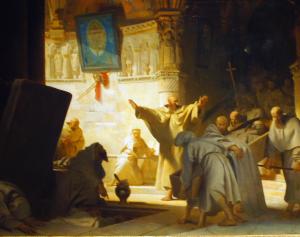
We can pursue the truth in many different ways, each of which has much to offer. Not everyone will or can pursue the truth in the same way. They are not meant to. Each way will provide a different way of apprehending the truth, and in that fashion, complement what others can get from their own engagement of the truth. Sometimes, we might find ourselves engaging the truth in a variety of fashions, but often, we find ourselves embracing a few or even one way of approaching it. We have different opportunities and abilities. What is important is that we pursue the truth. Some might do so through scholarly studies, which, to be sure, can offer great insight, but it requires someone to read and contemplate a great deal of material in order to get the most out of their studies. While it can and does offer much, because of what has been left to us is indeed significant, we must remember it also has its limits, for what it does not offer, by itself, is a direct engagement of the truth. It is far more indirect and abstract, while the greatest apprehensions of the truth requires experience, and engagement and reflection of that experience, which is why many of the greatest forms of insight can be had without such scholarly pursuits.
Certainly, we must not undermine the value of scholarly studies. They can and do help shape people so that if they take what they learn and use it to act and experience the truth for themselves, it can serve as a good formation for one’s pursuit for the truth. Indeed, it will allow people to have the tools to gain the most out of their own lived experience, which is why, thought scholarly pursuits are not required, we should not use that fact to become anti-intellectuals, as it were.
What is important is that we realize both the potential and the limitations involved with a purely scholastic engagement of the truth. Scholars collect knowledge. For some, that is all they do. Others, who get more out of their studies, extrapolate from what they have read, so as to reason out the kinds of conclusions their studies could establish. Thus, scholars can provide something new to the world, and in doing so, help make sure our collective apprehension of the truth is not only remembered, but increased from generation to generation. That is, scholars offer great contributions to society because of the way they engage what has been handed down to them; they sift through all kinds of material to highlight the best, most significant elements of it, while helping to develop that insight themselves so as to make sure our collect knowledge can be said to advance from generation to generation. This means that their contribution is often derivative in nature; they take what was given to them and develop it instead of having significant insight and experiences of their own. To be sure, there are many scholars who are more than scholars, many who lead active lives which gives them insight beyond their studies, but such insight is not necessary for scholarly studies, and indeed, the best scholarly work requires so much time and study that it leaves little room for such active work.
The more that is written, the more that has to be read and examined by the next generation of scholars; the better the scholar, the more the scholar will know what was said and done by others, leaving less and less time for their engagement of the truth for themselves. They will write commentaries, or commentaries on commentaries, referencing work after work to prove their point. They can get so caught up in their studies, it influences their thoughts, which makes it hard for them to live in the present engaging contemporary concerns, as all their knowledge and understanding comes from the past. It is easy for a scholar to end up thinking all questions can be answered simply by exploring the questions and answers of the past. And because they are the masters of such knowledge, they can become prideful of what they know and think themselves as being superior to everyone else. Truly, what they have come to know proves they have achieved a great accomplishment, but again, what they have to is derivative in nature. Someone who has more direct access to the truth will be able to engage it better, offering better answers to contemporary questions than those whose access to the truth lies only in scholarly studies. Not only will they be remembered by the general populace for their contributions, they will then become a part of the scholarly tradition, as their wisdom will be collated, studied, and joined to the rest of the scholarly tradition, while many scholars will only be remembered by their fellow scholars.
All of this explains why some of the greatest spiritual masters remind us of the greater value of other forms of insight, other forms of engagement with the truth, than scholarly reflection (or any discipline which relies upon it, such as philosophy). Not everyone will be formally educated, but in order to engage the truth and learn from it, one doesn’t have to be. Various spiritual practices can also provide great insight into the truth, for they will have us experience the transcendent truth for ourselves. And, they point out, as the absolute truth transcends all intellectual reasoning and reflection, this is why it does not require scholarly studies in order for someone to become attuned to it (which is not to say scholarly studies cannot discuss it, represent it, or help suggest ways to reflect upon what is learned from such experiences, for of course, as their best, they can and do so). This understanding is often presented in monastic tradition through stories showing the way a particular monk or nun engaged some sort of scholarly or philosophical person who came to them to learn from them or else to dispute with them and try to show themselves as being superior to the “unlettered” ascetic. How that encounter is presented, and how the monk or nun with their spiritual wisdom, deals with the intellectual will depend upon the reason why the person came to meet with them. Those who came to confront and challenge the spiritual master will often find themselves humiliated in the encounter. Those, however, who came to learn from them, will go away amazed and edified by what they have learned, such as in an event recorded in the Spiritual Meadow:
Some philosophers once visited an elder, and after he had offered a prayer he remained silent, braiding cord and paying no attention <to them>. Though besought him, saying: ‘Say something to us, father’, but he held his peace. They said to him: ‘This is what we came for: to hear you say something and to benefit <from it>.’ The elder said to them: ‘You spend your money to learn how to speak; I left the world to learn how to keep silent’. They were filled with amazement on hearing this and went their way edified. [1]
Philosophers were expected to be educated about what was said and thought about in the past, and for this reason, they were expected to be scholars as well as critical thinkers. It took much time and money to establish oneself as a philosopher, for books were not cheap, and those who wanted to be recognized as a philosopher, had to study and learn the discipline from others who already established themselves as a philosopher. Thus, a good philosopher read books, reflected upon what others had said in the past, and used it all, with their own personal insight and wisdom, to form their own opinions about the truth. Few learned how to engage the transcendent reality for themselves. It is not something which comes from money. It is not established by study. Discursive reason can only lead them so far. The elder, knowing this, did not tell them they were wrong to have pursued their studies, but suggested something which they have not learned to do: to silence themselves so as to experience the world as it is without being interpreted or filtered by their thoughts or ideologies. This is what the monk had learned to do, and in doing so, the monk had found himself embracing—and being embraced – by the transcendent truth; the monk could not do so in the world, so the monk left the world, as it were, to engage that silence. Through silence, he experienced his connection with the absolute, and the absolute’s connection with him. He didn’t need to spend any money to do this, indeed, to do it, he abandoned the pursuit of money itself and all that was connected with it. He didn’t need formal education to do so, though he probably needed and was given spiritual training to help him start in his journey so that he would know how to embrace silence and become aware of the presence of the absolute in that silence (which is why it can be said, while it cost him nothing, it cost him everything, as he had to give up everything, silence everything, in order to properly attune himself to the absolute for himself).
The philosophers were edified, for the monk spoke with the wisdom of experience, something which they did not yet have. They could take what he said and use it for scholarly reflection, or they could also take what they learned, and use it to embrace the monk’s path for themselves. We do not know what they did. We do know someone remembered the event, and wrote it down, allowing it to be preserved in scholarly tradition, showing us, once again, that though scholarship might be derivative in nature, that does not mean it has nothing to offer. It can even remember and give us insight in ways which transcend itself, which is what we see here. This is why, even if we must not absolutize the value of scholarship, we must also not dismiss it as a useless endeavor. Without its remembrance of the past, we would have to relearn everything ourselves, meaning, we would find ourselves in a dead end, rarely advancing in our engagement with the truth. And even if someone were to learn something transcendent, it would be something quickly forgotten and perhaps never learned ever again.
[1] St. John Moschos, The Spiritual Meadow. Trans. Jon Wortley (Collegeville, MN: Cistercian Publications, 1992; repr. 2008), 199 [#222 Nissen 3 possible connection but not necessary to the overall Spiritual Meadow].
Stay in touch! Like A Little Bit of Nothing on Facebook.
If you liked what you read, please consider sharing it with your friends and family!













